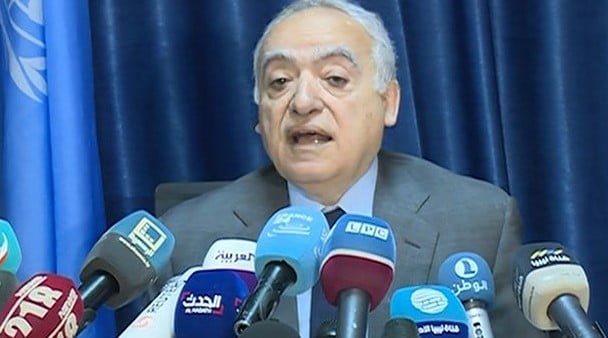By Sami Zaptia.

London, 20 March 2019:
At a press conference held in Tripoli today, UNSMIL head Ghassan Salamé announced that his planned National Conference (@Multaqa.Libya) will be held from 14 to 16 April at the neutral city of Ghadames.
There had been concern that if Salame did not choose what was perceived as a neutral venue by Libya’s east and west they would not attend the National conference.
Salame said that there would be between 120-150 delegates at the event, all Libyan and representing all components of Libyan society. He added that all attendees will be Libyan as there would be no foreign parties present at the Conference.
Keen to allay the fears and suspicions of the two Libyan Political Agreement bodies, and to secure their attendance, Salame stressed that the Conference will not be an alternative to existing representative political institutions such as the Presidency Council, the House of Representatives (HoR) and the High State Council (HSC).
The HoR and HSC have been worried that the Conference was Salame’s attempt to further weaken them and undermine their authority and legitimacy by by-passing them and going over their heads directly to the Libyan public. To this end, they had demanded to know more details in advance about the National Conference such as its agenda, make-up and number of attendees, location and authority of its outcomes.
There have also been persistent rumours that the HoR / the east / Hafter and their allies in the west, have been or are planning an alternative National Conference to negate any possible negative outcomes from Salame’s National Conference.
Salame also explained that the National Conference will not have executive powers but will offer recommendations. These will include recommendations on the date of presidential and parliamentary elections and the manner in which they will be carried out. He explained that It will then be for the HoR and the HSC to respond to the recommendations, but that the UN would endorse the recommendations made by the National Conference.
However, in a thinly veiled threat, Salamé also said that if the HoR and HSC did not respond to the demands for elections of the silent Libyan majority of over 85 percent – he would find alternatives.
Adding to the intrigue about what was really agreed at the meeting, Salame came across as lukewarm when asked about the Abu Dhabi Haftar-Sarraj meeting. However, he indicated that there would be further meetings between the two.
His emphasis that the National Conference will not have executive powers is designed to reassure the HoR and State Council and ensure that those from it who were invited – would attend.
It will be recalled that the National Conference was part of Ghassan Salame’s multi-pronged 2017 Libya Action Plan. This was intended to pressurise the HoR and HSC to break the political impasse, precipitate elections and take Libya out of its current transitional state.
It will also be recalled that Salame’s UNSMIL had secured the services of the Geneva-based Centre for Humanitarian Dialogue (HD) to conduct a series of town hall meetings to canvass Libyan public opinion.
The final report of these regional conferences was released in November 2018. The process had started on 4 April and had reported its initial findings in May 2018. The findings had reported that Libyans wanted:
- · A united Libya capable of defending its borders and sovereignty
- A united military institution, free from political interference and committed to the national interest
- More fair distribution of resources through a decentralized state
- A government based on competence, not identity
- Professional police services to ensure local security
Over 14 weeks, more than seventy-five meetings were held in Libya and abroad where over 7,000 Libyans had participated, a quarter of whom were women. Salame had reported that 2,000 submissions were received online. 130,000 followers have joined the consultative process on social media, generating half a million comments. Digital messaging reached over 1.800.000 persons.
Salame said that this bottom-up process was an integral part of his Action Plan, putting the Libyan people at the heart of the political process, whoever or wherever they may be. For many communities, this was the first time they had been actively engaged in the political process and consulted on the future of their nation, he had explained.
The National Conference local consultations, he had said, had provided a tremendous insight into the hopes, fears and visions of the Libyan people for a way forward. The next phase of the National Conference would be the distillation of the thousands of pages of reports into a full and final report with national conclusions and recommendations, to support the next steps out of transition, he had explained.








